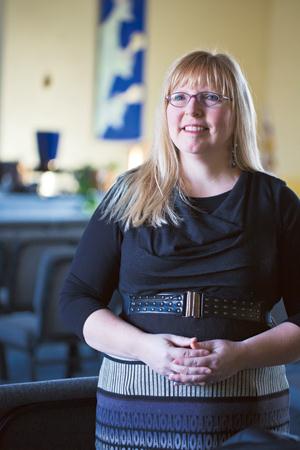
Worshippers at New Direction Ministries uprooted a dead tree from a nearby forest and placed it in their church to represent a cross. Executive director Wendy Gritter, pictured, has tried to heal the rift between the gay community and Evangelicals. Credit: Adam Coish
Wendy Gritter doesn’t sound like a revolutionary.
But the executive director of New Direction Ministries has spent the last decade navigating a very strained relationship between Evangelical Christian and queer communities. And she’s come out of it every bit a radical.
Her position? Homosexuality isn’t a choice, and you can’t fix it.
That might not sound so incredible until you realize that New Direction used to have a very different outlook on homosexuality.
Started in 1985, New Direction was founded by a born-again missionary struggling with her own lesbian desires. She launched the ministry as a beacon for those looking to subjugate unwanted same-sex attraction and replace it with supposedly healthy, straight feelings and a love of god.
New Direction was part of a movement that crafted a new fight against homosexuality. It wasn’t a fight that took place in the legislature or the courtroom, but rather in a church or a therapy session. It was a movement that held an unwavering belief that homosexuality was a curable social ailment.
When New Direction’s first executive director left the organization, after a period of transition, Gritter took over. She’s been leading the Mississauga-based ministry for the last 11 years.
But with Gritter’s ascent to the helm, New Direction broke with its colleagues and announced a shift that left it without many friends.
Leaving social conservatism
That shift was brought on by a period of intense reflection. New Direction started talking with those who went through the process of “curing” their homosexuality — so-called ex-gays — and found a new awareness of the incestuous relationship between political conservatism and these ex-gay ministries. Gritter remade New Direction into a safe space for queer Evangelicals and began tackling head-on those ministries that mixed politics, religion and therapy. The organization lost half its donors almost overnight.
“You would see this rift between the gay community and the Evangelical community,” Gritter says. The first step to bridging that gap for New Direction was to concede that homosexuality was not a choice and that the ministry had no place in politics.
“We were very strongly critical of political engagement on the part of the Evangelical ministries that were… lobbying against gay marriage, or in worse cases, lobbying against basic civil rights,” Gritter says. “It was really creating a depth of cynicism and, I think, justifiable anger in the LGBTQ community towards Evangelicals.”
The ministry began counselling both Evangelical Christians who had trouble reconciling their faith with their sexuality and those who had gone through reorientation therapy that had done more damage than good. Gritter had one employee who was openly gay who had survived every form of reparative therapy, opting in the end for a celibate lifestyle.
“We had the opportunity to get to know more of the LGBT community who had been very hurt by the church,” Gritter says. “It became more and more difficult to jump through the orthodoxy hoops.”
She coined her own philosophy for it: “generous spaciousness.” It’s the idea that neither sexuality nor religion are monolithic, and therefore the church should meet individuals where they are, spiritually and personally, rather than try to impose a singular philosophy or position on everyone.
That means that New Direction no longer insists that everyone should be in a heterosexual relationship. It also means it doesn’t instruct people on how to interpret their homosexuality. “We think this is where we’re called to be: in this place of tension,” Gritter says.
That doesn’t mean the group entertains the idea of reparative therapy — Gritter says the evidence doesn’t support that such therapy works — but, in a rare few cases, if people are adamant that they cannot have same-sex relationships, the ministry can meet them there.
“Sexuality is more fluid than it’s ever been,” she says. “It’s not even a spectrum; it’s a tangled ball of yarn.”
She says working with people who know they’re gay but who can’t accept being in same-sex relationships is “a terrain fraught with landmines,” but there are ways to work with them where there’s no shame, stigma or self-loathing.
At the end of the day, New Direction’s message sounds an awful lot like “You’re gay, deal with it — we’ll help.”
“Most social conservatives see us as having slid down the slippery slope of relativism and contributing to the moral decline of the world,” Gritter says, chuckling.
Even Exodus International, a network that used to encompass a huge number of gay reparative groups that was once public enemy number one for many in the gay community, has done a 180-degree turn. It has overhauled its positions: repudiating reparative therapy, opposing anti-gay legislation and recognizing how anti-gay rhetoric can lead to bullying and violence. Exodus declined to speak with Xtra about this story.
New Direction was formerly a member of Exodus, before its reinvention, but had a public falling-out over gay rights.
But while New Direction and Exodus may have closed the door and turned off the lights on the increasingly controversial therapy, there are still plenty of groups that are sitting in the darkness.
‘It’s god who transforms people’
American reparative therapy groups have had the public spotlight shone in their faces in recent years, with a series of high-profile stories and interviews highlighting the increasingly bizarre and suspicious practice. That came to a head in December when California passed a ban on the therapy for anyone under the age of 18.
The National Association for Research and Therapy of Homosexuality (NARTH) managed to put that bill on hold by launching an injunction in federal court. It has been at the forefront of the ex-gay movement for more than two decades, presenting itself as the face of the reparative therapy world.
While the therapy might seem like the offspring of the fringes of the American Evangelical world, Canada has developed its own community of reparative groups: Living Waters Canada, Courage, Ta Vie Ton Choix and Exodus Global Alliance, a splinter group from Exodus International, all practise the therapy to varying degrees. Courage, a group sanctioned by the Holy See, operates out of various churches, most notably, the Roman Catholic Diocese of Calgary. Courage fashioned its approach to combating homosexuality after Alcoholics Anonymous’s 12-step program. The group’s starting premise is “we admitted that we were powerless over homosexuality and our lives had become unmanageable.”
Ta Vie Ton Choix, a francophone group based in Quebec that practises the therapy, has enjoyed celebrity status in the reparative world. The group’s co-founder and main practitioner of reparative therapy, Michel Lizotte, was recognized with an award by NARTH in 2011. His secular view of reparative therapy is that failure to conform to gender norms tends to lead to homosexual desire.
On his site, Lizotte writes of a 1996 study that he says disproves the idea that heterosexuals and homosexuals are the same: “if sexually active homosexuals have any traits in common with other groups, it’s more so with prostitutes, illegal drug users and heavy smokers.” He goes on to say that substance abuse, mental health issues and criminality are connected to homosexuality.
While Lizotte writes that the group is against all forms of hate, discrimination and injustice targeted at homosexuals, he vows to “take legal measures against all people who manipulate the information on this site in a measure to suggest that our organization is homophobic, religious or that it diffuses hate speech or a fanatical or fundamentalist ideology.”
Lizotte declined to be interviewed for this story, saying that he feels burned by the work of other journalists who are quick to cite the American Psychiatric Association while ignoring NARTH’s studies. The theories espoused by Lizotte have no peer-reviewed basis and have been repudiated by virtually every relevant professional medical association in the US and Canada.
Both Living Waters and Exodus receive hundreds of thousands of dollars in tax-free donations every year, thanks to their charitable status. Living Waters, under its two registered charities, received more than $1.7 million between 2010 and 2011. Exodus Global Alliance received just shy of $190,000 in those years. Its tax-exemption is unacceptable to the federal New Democratic Party, which has called on the government to revoke its charity status.
Living Waters is one of the better known groups charged with practising reparative therapy. It has been a mainstay of the reparative therapy world in Canada for decades. Currently, it offers programs in Vancouver, Edmonton, Winnipeg, Cambridge, Toronto, Peterborough, Montreal, Halifax and Charlottetown. Living Waters’ process, which can run anywhere from five to 25 sessions and can cost $500, claims to be able to tackle a wide array of emotional and sexual problems, including homosexuality. Its counsellors run a variety of programs, one of which is aimed specifically at teenagers.
“I will keep it simple — it is god who transforms people, not Living Waters. We are simply a healing and discipleship ministry,” says Debbie Jiang, development director for Living Waters.
Jiang is emphatic that the group doesn’t fit in the guarded community it’s been lumped into. “Understand that [Living Waters] does not practise gay reparative therapy full stop,” she says in an email exchange with Xtra.
To hell with full stops, says Darin Squire: he went through Living Waters’ reparative therapy program. “Horrific, over-the-top,” is how he describes the group. He enrolled in their program after years of trying to sublimate his homosexual desires with other Evangelical groups.
He says that he saw all stripes of reparative therapy at Living Waters. The most painful was aversion therapy, wherein the counsellor would force him to relive abuse he suffered at the hands of his father in his childhood, then tie it to same-sex desires he experienced. “They sexualized abuse,” he says.
The practice, common in reparative circles, is meant to tackle the supposed root causes of male homosexuality — estrangement from the father and an over-dependence on the mother — but critics say it can lead to lasting damage in the way that these people perceive their own sexuality.
Squire says that Living Waters also enforced very strict expectations of what his gender role should be. “It was silly little things, like how we sat in chairs. Men were not allowed to cross their legs at the knee,” he says. At one point, a reparative counsellor told him, “Stop dying your hair, take out your earring and go play football.” The best Squire could do was watch sports on TV with a straight friend.
Gritter cautions against innocuous-sounding programs. “Where the damage really comes in, in my opinion, is when the idea of working through some of these experiences — if the individual has actually experienced them — is connected to the experience of same-sex attraction,” she says. “This is where doubt, shame, fear, et cetera can really kick in.
“You get people who lose their sense of creativity, they lose some of their spark, their humour, some of their capacity to desire life. Sometimes that means a deep depression; sometimes it means they’re kind of numb,” she says.
Squire, who spent years in the ex-gay community throughout the early 1990s struggling with conflicting forces of sexuality and shame, says he was convinced “it was my fault. I wasn’t reading enough Bible verses.” He started this process at 15 in London, Ontario, when he came out of the closet to his Christian youth group. He was immediately told, “You can walk away from it.”
That eventually meant leaving all his gay friends: “They were in sin. They were not a good influence on me. They were of the devil,” he says of his mentality at the time. He was told — by ex-gays, his parents and his youth group — that his sexuality was irreconcilable with his faith. It was one or the other. The choice was clear, for him. “I didn’t want to walk away from god,” he says.
That path led him to numerous counsellors, Living Waters and New Direction — the previous incarnation of New Direction, before Gritter.
He was still a teenager at the time, pursuing a dream of working as a youth minister. He got engaged while in Bible college, but it didn’t last. Not long after, he was told that he would never be ordained and he would never work with children because of his (then) former sexual “preference.”
“It was a shaming thing,” he says.
After ex-gay
Squire’s falling out from the ex-gay world was drastic. After New Direction began undergoing a period of transition — with the ousting of its first executive director amid rumours that she was in a homosexual relationship — and the intense therapy he endured at Living Waters, he gave up, deciding, “I can’t deny who I am.”
But, with his relationship with his own sexuality unresolved, he descended into a self-destructive “depraved, horrific lifestyle.”
Eventually he found the queer-affirming Metropolitan Community Church in Toronto. While it helped reconcile his sexuality and his religious side, Squire soon drifted away from Christianity altogether.
After coming out for the second time, Squire ran into a group of fellow ex-gays he had seen every Monday night while at New Direction — at a gay bar. As it turns out, while he was poring over his Bible, his fellow ex-gays had been hitting the off-limits Church Street. “You were the poster child for the ex-gay movement!” they told him.
New Direction found its way back into Squire’s life years later. A friend’s parents had gone to the ministry for help with their gay son. Rather than finding the old ministry they were expecting, they found Gritter, who pushed them to accept their son’s sexuality. They did, says Squire, and it brought the family back together.
Squire didn’t buy it, convinced it was all an act to clandestinely continue New Direction’s old work with a kinder face. He met Gritter for coffee to let her know that he wasn’t fooled. “I was going to take her down,” he says.
But, after chewing out Gritter for two hours, Squire found a group that had changed. Gritter apologized profusely and took all the attacks he had thrown at her, then spent the next week working to improve New Direction’s website and literature to address them.
Squire, who has been in touch with many others in the so-called ex-ex-gay community, says the reparative therapy industry is “a lot larger than we imagine.” He had heard of plans to expand Exodus International and New Direction, back when they still did reparative therapy, all over Canada. Those plans seem shelved for the time being.
Because there is no organized network of reparative therapists like NARTH in Canada, it’s difficult to know just how extensively it is being practised.
California recently became the first jurisdiction to ban gay reparative therapy for youth. South Africa, meanwhile, has just moved to investigate a church that promises to “cure” homosexuality. Canada has not yet had any public discussion about banning the therapy, though the federal NDP voted to condemn the practice at a delegates’ convention in 2011.
Squire says he is now on “a spiritual path of my own choosing.” He’s openly gay and making a living as an administrative assistant.


 Why you can trust Xtra
Why you can trust Xtra


